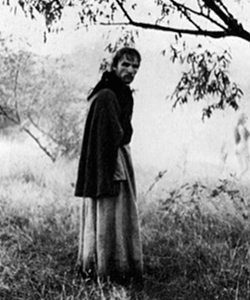Review: Weekend (2011)
Andrew Haigh’s Weekend (2011) can be summarized in one word: remarkable. It is a film that deals with homosexual topics, but doesn’t make the characters’ sexual orientation the primary focus of the film.
The film opens with Russell (Tom Cullen), a burly gay man who, after leaving his friend’s party, decides to go to Propaganda, a local gay club. There he spots an attractive man named Glen (Chris New), whose evasive glare looks for someone to go home with that night. After a series of unseen events, Glen and Russell go back to Russell’s apartment where the two have a casual hookup. The morning after brings about an interesting situation as Glen asks Russell if he can interview him about their hookup. As Glen probes Russell for answers to personal questions, Russell’s honest replies reveal that something deeper is developing between the two. Their hookup becomes something profound, but Glen’s admission of his departure to Portland for two years, as well as his confession of his unwillingness to be in a relationship, puts a hitch in the plan. Despite these obstacles, the two decide to make the most of their limited time together, knowing full well that they may be devastated by the end results.
Most films that deal with this subject matter divert between two narratives: they either pursue the “coming out” narrative that follows the initial denial, and later acceptance, of the character’s sexuality; or they use the “rom-com” narrative that plays with clichéd conventions and one-dimensional characters, ending the film with a white picket fence and 2.5 kids. Weekend departs from these formulaic narratives and instead creates its own genre, one that constructs a brutally realistic portrait of romance. The film is on par with last year’s Blue Valentine (Derek Cianfrance, 2010), which depicted the dissolution of a marriage. However, Weekend does not look to portray the pessimism of a break up, but the impact of an experience. It is a strange hybrid whose story and dialogue resemble the films of Mike Leigh, and whose shot compositions resemble Michelangelo Antonioni’s carefully constructed landscapes. The best way to describe the film is to borrow Glen’s description of people who hook up: He says that they are “blank canvases” who create a gap between what they want to be and who they really are. Weekend is a blank canvas, one that is used by Haigh, Cullen, and New to create a movie that doesn’t resemble a typical “gay movie,” but rather attempts to craft something of importance.
The film is grounded by Haigh’s harsh depiction of this relationship. He does not sugarcoat their romance, nor does he idealize their situation. The characters exist in the real world, and as such, much deal with the consequences of their actions and decisions. Under the direction of Haigh, Tom Cullen and Chris New craft wonderful portraits of these two men. Cullen creates Russell as an “everyman,” one who is looking for love in all the wrong places. Countering Russell’s naivety is Chris New’s Glenn, whose strong grasp on reality forces him to avoid being tied down to anyone or anything. Haigh masterfully directs the two in this difficult situation, leading to a climax that with leave viewers with tears in their eyes.
By depicting Russell and Glen’s brief romance, Haigh does something magical: he creates a silent revolution, one that doesn’t flaunt overt sexuality, drug excess, or queer sensibility in the viewer’s face. Instead, Haigh’s film is revolutionary because it portrays the ordinary. It shows how this story can take place anywhere: inside a cheesy dive bar, behind a crowd in a subway, or even in the privacy of a man’s bedroom. It’s a heart-wrenching tale that forces all viewers, whether gay or straight, to confront memories of past relationships and the tears that are associated with goodbyes. Beyond that, it is a beautiful film that, like Glen and Russell’s brief romance, is something that viewers will cherish long after they leave the theater.














 Review: The Texas Chainsaw Massacre (1974)
Review: The Texas Chainsaw Massacre (1974) Review: True Crime (1999)
Review: True Crime (1999) Review: Everything Must Go (2011)
Review: Everything Must Go (2011) Review: Batman Year One (2011)
Review: Batman Year One (2011) Review: Real Steel (2011)
Review: Real Steel (2011)



